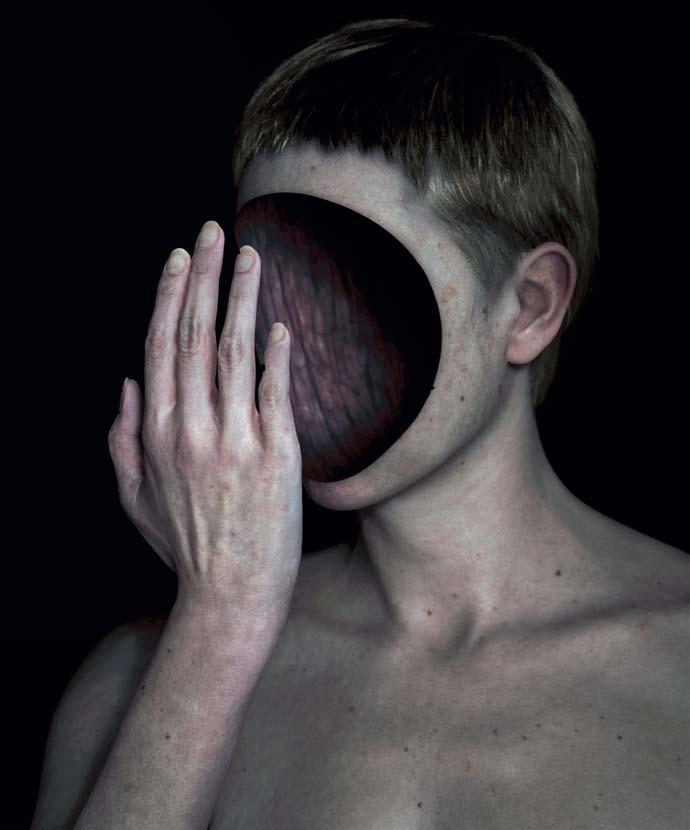
Two people dressed in black are kneeling on the floor, so still that they must surely be in pain. If they are grimacing, there would be no way to know - their features are obscured by oversized, smooth gold masks, as though they have buried their faces in half an Easter egg.
Their stillness makes them seem like sculptures, and only by checking for the subtle rise and fall of their chests can you confirm they are indeed human. Which is fitting - because they aren't actually human, at least not totally. They're human-machine hybrids, "Idioms", created by French artist Pierre Huyghe for his exhibition, Liminal, at the Punta della Dogana in Venice.
Idioms are wandering the exhibition for its run between March and November. Sensors in their masks monitor the rooms they sit in and visitors they encounter, and artificial intelligence will gradually convert this information into a brand new language-building a dictionary until they will even be able to communicate with one another. Every day, their knowledge will accumulate; Huyghe wonders what they might be able to say in 20 years' time.
Shortly before the exhibition opens to the public, two Idioms kneel in a darkened room opposite a large black box suspended from the ceilingthis is a "self-generating instrument", producing ambient music and crisscrossing beams of light. In response to the artwork in front of them, the Idioms appear to have only generated a few syllables, repeated as the LED screens on their foreheads glow gold.
هذه القصة مأخوذة من طبعة April 19, 2024 من The Guardian Weekly.
ابدأ النسخة التجريبية المجانية من Magzter GOLD لمدة 7 أيام للوصول إلى آلاف القصص المتميزة المنسقة وأكثر من 9,000 مجلة وصحيفة.
بالفعل مشترك ? تسجيل الدخول
هذه القصة مأخوذة من طبعة April 19, 2024 من The Guardian Weekly.
ابدأ النسخة التجريبية المجانية من Magzter GOLD لمدة 7 أيام للوصول إلى آلاف القصص المتميزة المنسقة وأكثر من 9,000 مجلة وصحيفة.
بالفعل مشترك? تسجيل الدخول

The Saudi football World Cup is an act of violence and disdain
Well, that's that then. In the event there were only two notes of jeopardy around Fifa's extraordinary virtual congress last week to announce the winning mono-bids, the vote without a vote, for the right to host the 2030 and 2034 football World Cups.

AI has made the move into video and it's worryingly plausible
I recently had the opportunity to see a demo of Sora, OpenAI's video generation tool, which was released in the US last Monday, and it was so impressive it made me worried for the future.

With tyrant Assad ousted, Syrians deserve support and hope
Last week, time collapsed. Bashar al-Assad's fall recalled scenes across the region from the start of the Arab spring almost 14 years ago. Suddenly history felt vivid, its memories sharpened. In fact it no longer felt like history.

TV
The Guardian Weekly team reveals our small-screen picks of the year, from the underground vaults of post-apocalyptic Fallout to the mile-high escapism of Rivals

Albums
Murky love stories, nostalgic pop and an in-your-face masterpiece captured our critics' ears in 2024

Film
Visual language, sound, light and rhythm are to the fore in the best movies of the year

Hidden delights Our 24 travel finds of 2024
Guardian travel writers share their discoveries of the year, from Læsø to Lazio

'It's really a disaster' The fight to save lives as gang war consumes capital
Dr James Gana stepped out on to the balcony of his hospital overlooking a city under siege. \"There's a sensation of 'What's next?'. Desperation is definitely present,\" the Médecins Sans Frontières (MSF) medic said, as he stared down at one of scores of camps for displaced Haitians in their country's violence-plagued capital.

Trailblazers The inspiring people we met around the world this year
From an exuberant mountaineer to a woman defiantly facing the guns of war, here are some of the brave individuals who gave us hope in a tumultuous 2024

Votes of confidence
From India to Venezuela and Senegal to the US, more people voted this year than ever before, with over 80 elections across the world. With rising authoritarianism and citizen-led resistance revealing its vulnerabilities and resilience in the face of unprecedented challenges, has democracy reached its breaking or turning point?